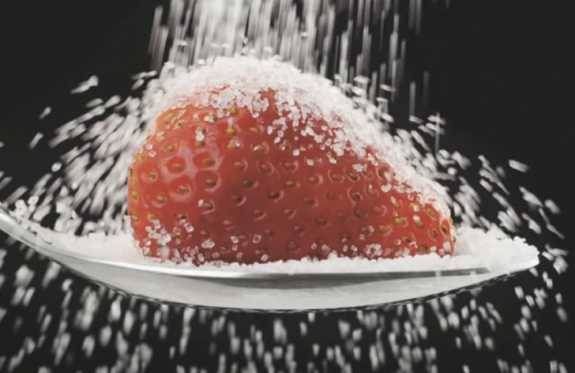What’s More Damaging: Sugar? or Artificial Sweeteners?
- At October 08, 2014
- By Katherine
- In Articles, News
 1
1
Katherine’s 5 Tips are at the end of the article…
For years, my clients have asked me, “Is it better to eat ‘sugar-free’ yogurt? Or, yogurt with fruit on the bottom with all that sugar? What about sugar in my coffee? Sugar-sweetened beverages, like soft drinks?” My answer has alway been, to my clients’ surprise, “A little sugar won’t hurt. Eat the yogurt you enjoy the most, even if there’s a little jam at the bottom! And a teaspoon of sugar in your coffee shouldn’t do any harm.” New scientific research may prove my moderate approach has been right all along.
Artificially sweetened beverages and foods are seen as guilt-free pleasures, because they are lower in calories – or even zero calories – compared to other similar foods. You may think of them as a great choice when you’re trying to lose weight or trying to keep blood sugar in check. But some surprising new research suggests that artificial sweeteners might actually do the opposite, “by changing the microbes living in our intestines [1],” according to experts at The National Institutes of Health.*
To explore the impact of various kinds of sweeteners on the zillions of microbes living in the human intestine (referred to as the gut microbiome), an Israeli research team first turned to mice. One group of mice was given water that contained one of two natural sugars: glucose or sucrose; the other group received water that contained one of three artificial sweeteners: saccharin (the main ingredient in Sweet’N Low®), sucralose (Splenda®), or aspartame (Equal®, Nutrasweet®). Both groups ate a diet of normal mouse chow.
To their surprise, the researchers discovered that many animals in the artificial sweetener groups—especially those that drank saccharin-sweetened water—developed a condition called glucose intolerance, which is characterized by high blood glucose levels and is an early warning sign of increased risk for developing type 2 diabetes. In contrast, the animals that drank sugar water remained healthy.
The result was puzzling. These mice weren’t consuming natural sugars, so what was raising their blood glucose levels? The researchers had a hunch that the answer might lie in the gut microbiome—since those microbes play a vital role in digestion. Their suspicions were borne out. When they used DNA sequencing to analyze the artificial sweetener group’s gut microbiome, they found a distinctly different collection of microbes than in the animals drinking sugar water.
The next step was to distinguish whether these changes in the microbiome resulted from high blood glucose, or caused it. When the researchers used antibiotics to wipe out the artificial sweetener group’s gut microbes, their blood glucose levels returned to normal—evidence that the gut microbes were actively causing glucose intolerance. Additional proof came from experiments in which the researchers transplanted microbes from both groups of mice into the intestines of a mouse strain that had been raised in a sterile environment from birth. The germ-free mice that received microbes from the artificial sweetener group developed glucose intolerance; those getting microbes from the sugar group did not.
But what about humans?
The research team examined clinical data from 400 people taking part in an ongoing nutrition study. That analysis showed that, compared to people who didn’t use artificial sweeteners, long-term users of artificial sweeteners tended to have higher blood glucose levels and other parameters often associated with metabolic diseases like diabetes, obesity, and fatty liver.
Next, the researchers asked seven healthy human volunteers, who had never previously consumed foods or beverages containing artificial sweeteners, to consume the daily maximum dose of saccharin allowed by the U.S. Food and Drug Administration for six consecutive days. Of the seven volunteers, four developed glucose intolerance, while three maintained normal blood glucose regulation. The researchers then took intestinal microbes from human volunteers and transplanted them into germ-free mice. Microbes from humans with glucose intolerance also triggered glucose intolerance in the mice, while microbes from humans with normal blood glucose had no effect.
Previous studies have associated changes in the gut microbiome with obesity and diabetes in humans [2, 3, 4]. But the latest findings, which still must be confirmed in larger studies and by other groups, advance our knowledge one step further by suggesting that artificial sweeteners may be one of what’s likely to be an array of factors with the power to shape such changes. Who knows what the next piece of that fascinating puzzle might be?
Katherine’s 5 Tips
- Use artificial sweeteners with caution,
- Just a spoonful of sugar/jam/honey can’t hurt – maximum 10% of your calorie needs – for example, if you need 1,500 calories per day, enjoy 150 calories worth of sweets per day,
- As usual, moderation is key. If you have trouble eating too many sweets, find out why and click for strategies,
- Eat plenty of yogurt, which contains natural probiotics, to populate your gastrointestinal tract with healthy microbes (they may help reduce body fat and insulin resistance),
- Eat plenty of high fiber foods, considered “prebiotics,” which increase the effectiveness of the probiotics, helping your gastrointestinal tract stay healthy,
- If you have an interest in learning more about sugar substitutes, take a look at the Center for Science and Public Interest’s “Sweet Nothings: Safe or Scary… The Inside Scoop on Sugar Substitutes.”
References:
[1] Artificial sweeteners induce glucose intolerance by altering the gut microbiota. Suez J, Korem T, Zeevi D, Zilberman-Schapira G, Thaiss CA, Maza O, Israeli D, Zmora N, Gilad S, Weinberger A, Kuperman Y, Harmelin A, Kolodkin-Gal I, Shapiro H, Halpern Z, Segal E, Elinav E. Nature. 2014 Sep 17.
[2] Microbial ecology: human gut microbes associated with obesity. Ley RE, Turnbaugh PJ, Klein S, Gordon JI. Nature. 2006 Dec 21;444(7122):1022-3.
[3] A metagenome-wide association study of gut microbiota in type 2 diabetes. Qin J, Li Y, Cai Z, Li S, Zhu J, Zhang F, Liang S, Zhang W, Guan Y, Shen D, Peng Y, Zhang D, Jie Z, Wu W, Qin Y, Xue W, Li J, Han L, Lu D, Wu P, Dai Y, Sun X, Li Z, Tang A, Zhong S, Li X, Chen W, Xu R, Wang M, Feng Q, Gong M, Yu J, Zhang Y, Zhang M, Hansen T, Sanchez G, Raes J, Falony G, Okuda S, Almeida M, LeChatelier E, Renault P, Pons N, Batto JM, Zhang Z, Chen H, Yang R, Zheng W, Li S, Yang H, Wang J, Ehrlich SD, Nielsen R, Pedersen O, Kristiansen K, Wang J. Nature. 2012 Oct 4;490(7418):55-60.
[4] Gut metagenome in European women with normal, impaired and diabetic glucose control.Karlsson FH, Tremaroli V, Nookaew I, Bergström G, Behre CJ, Fagerberg B, Nielsen J, Bäckhed F. Nature. 2013 Jun 6;498(7452):99-103.
*The article above is from the National Institutes of Health
Photo by www.sugar.org
For more fabulous tips and simple, effective ways to lose weight,
buy her book, Diet Simple!











Betsy
Katherine, thanks for the article about sweeteners and sugar — read it aloud to my teenage daughter who went to the fridge and got out a yogurt! E-mailed it to some fitness folks, too, and really appreciate the clear writing and citations.